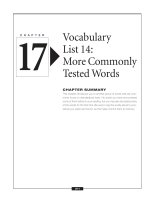Vocabulary list 15 - Philosophical terms
Bạn đang xem bản rút gọn của tài liệu. Xem và tải ngay bản đầy đủ của tài liệu tại đây (123.71 KB, 14 trang )
I
n this chapter, you will study some new words that are commonly used to discuss concepts and ideas in var-
ious fields such as philosophy, politics, and religion. Many of the words are also used every day in the news-
paper or on television. Perhaps once you have mastered the words in this chapter, you too will begin to use
them in your writing and speech, and someone will wonder if you yourself are a philosopher.
CHAPTER
Vocabulary
List 15:
Philosophical
Ter m s
CHAPTER SUMMARY
Some of the most influential work done over the last few thousand years
has been done not by anyone who built a famous building, won a great
battle, or discovered a new land, but by people who pondered the world
around them. They have investigated the nature of the world, explored
the meanings of concepts like truth, honor, and love, and tried to deter-
mine the ultimate purpose of life. These people were philosophers, and
their work and study is called philosophy. Everyone is a bit of a philoso-
pher in his or her own right, because each of us must decide what val-
ues we will live by and what our life’s purpose is. Some people may think
about these matters occasionally or very briefly, while others will spend
their lives searching for answers.
18
225
–
VOCABULARY LIST 15: PHILOSOPHICAL TERMS
–
227
13
4
2
6
5
78
9
12
1110
14
17
15
18
19
16
13
Across
4 a statement that seems to
contradict itself
6 a belief that is asserted to be
true
7 a practical or realistic
attitude
9 division of a subject into two
opposite classes or aspects
10 the belief in a pleasure-
seeking lifestyle
11 redundancy
12 the exact opposite
15 logical reasoning that leads
to a conclusion
17 an example or model
18 paradise
19 the science of reasoning
Down
1 worn out by overuse, trite
2 a quack
3 official beliefs or teachings
of particular politics,
philosophy, or religion
5 unselfish concern for others
8 theoretical idea or concept
13 “all natural processes occur
for a reason”
14 scholarly, learned
15 subtle differences between
word meanings
16 doctrines
Choose the word from the Vocabulary List that best fits into the crossword puzzle. You can check your answers
at the end of the chapter following the answers to the questions.
Vocabulary List 15: Philosophical Terms
abstraction
altruism
antithesis
banal
dichotomy
dogma
empiric
erudite
hedonism
ideology
logic
paradigm
paradox
pragmatism
semantic
syllogism
tautology
teleology
tenet
utopia
abstraction (ab·strak·shən)
(noun)
something that is not concrete or tangible, but is
more of a theoretical idea or concept, like truth
or beauty
We were discussing our relationships when Franklin
reminded us that love itself could be looked at
as just an .
altruism (al·tru˙·i·zəm)
(noun)
unselfish concern for the welfare of others
The couple’s had an immeasurable effect
on the entire community.
antithesis (an·ti·thə·səs)
(noun)
the exact opposite of something, or an extreme
contrast
I was really hoping for a promotion, but I received its
, a demotion to another office.
banal (bə·nal)
(adj.)
trivial, worn out by overuse, or used so commonly as
to have lost all interest and novelty
Long after people had stopped saying “far out,” Tim
continued to use the expression.
dichotomy (d¯·ka·tə·me¯)
(noun)
the division of a subject into two opposite classes or
aspects, such as internal and external
We were intrigued by all the interesting possibilities
that the of the experience
presented: are ghosts real or illusions?
dogma (do·mə)
(noun)
the official beliefs, principles, or teachings, such as
those of a religion, political party, or
philosophy, used most often with the added
implication that these beliefs or teachings
should be strictly adhered to
He lived faithfully by the of his religion.
empiric (im·pir·ik)
(noun)
someone who begins a practice such as law or
medicine without the proper professional
education and experience; a popular slang term
for this is a quack; or one who is ignorant of the
scientific principles and relies completely on
practical experience
Bethany recommended I see her friend for the pain
in my back, but I had met him and was sure he
was just an .
erudite (er·ə·d¯t)
(adj.)
scholarly, learned, well read, having extensive
knowledge
Her opinion easily impressed the
instructor and persuaded us all to agree with
her.
hedonism (he¯ ·dən·i·zəm)
(noun)
the belief that everything in life should be done to
bring pleasure; a pleasure-seeking lifestyle
The we practiced in our youth brought
us as many problems as it did pleasures.
ideology (¯·de¯ ·a·lə·je¯)
(noun)
the doctrines, beliefs, or opinions of a person, group,
or school of thought
He explained his to us and then we better
understood the way he chose to live.
logic (la·jik)
(noun)
the science of correct reasoning used to discover
truths, or any method of reasoning, whether it
reveals true and valid statements or not
If we use some , I am sure we can figure
out this riddle.
–
VOCABULARY LIST 15: PHILOSOPHICAL TERMS
–
229









